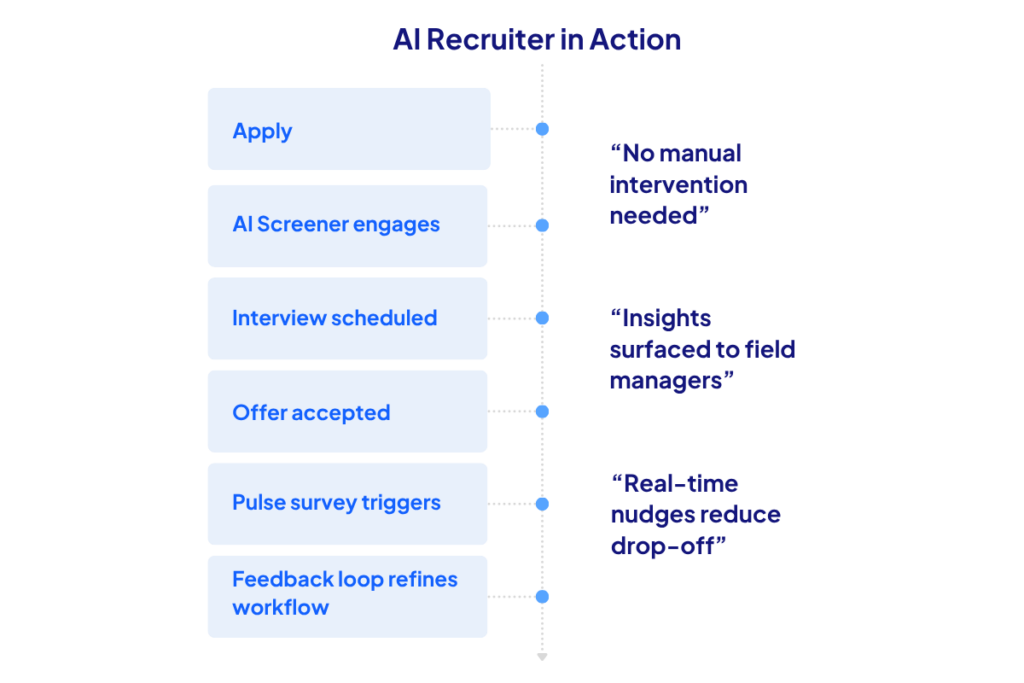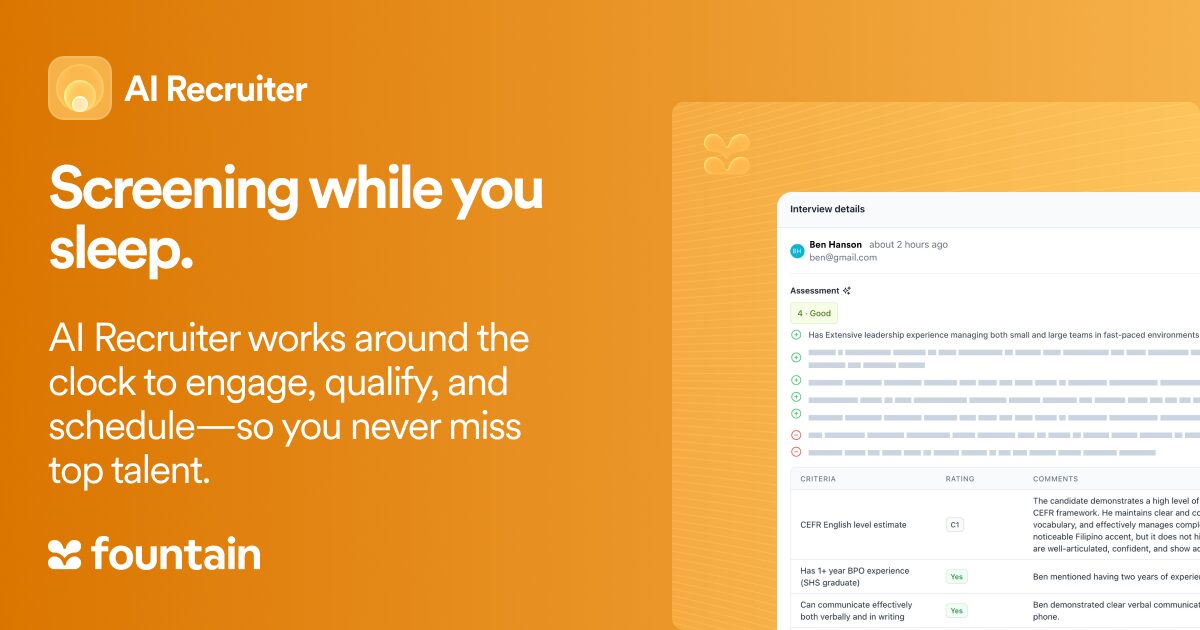Introduction
Frontline industries are at a critical turning point. Labor shortages, high turnover, and rising hiring costs are putting more pressure on HR teams than ever before. Most traditional HR tools simply aren’t built to keep up—they focus on automating isolated tasks like resume parsing or email reminders, rather than addressing the bigger, system-wide inefficiencies that slow hiring speed and scalability.
Enter Agentic AI: a new class of artificial intelligence built not just to automate tasks, but to plan, adapt, and act independently in support of HR and business objectives.
Unlike legacy automation, Agentic AI systems are goal-driven, context-aware, and cross-functional. They can orchestrate complex workflows—such as sourcing, scheduling, onboarding, and retention—and adjust in real-time based on the outcomes.
In this post, we explore five of the most common and costly problems facing frontline hiring teams—and how Agentic AI is helping forward-thinking employers address them with measurable success.
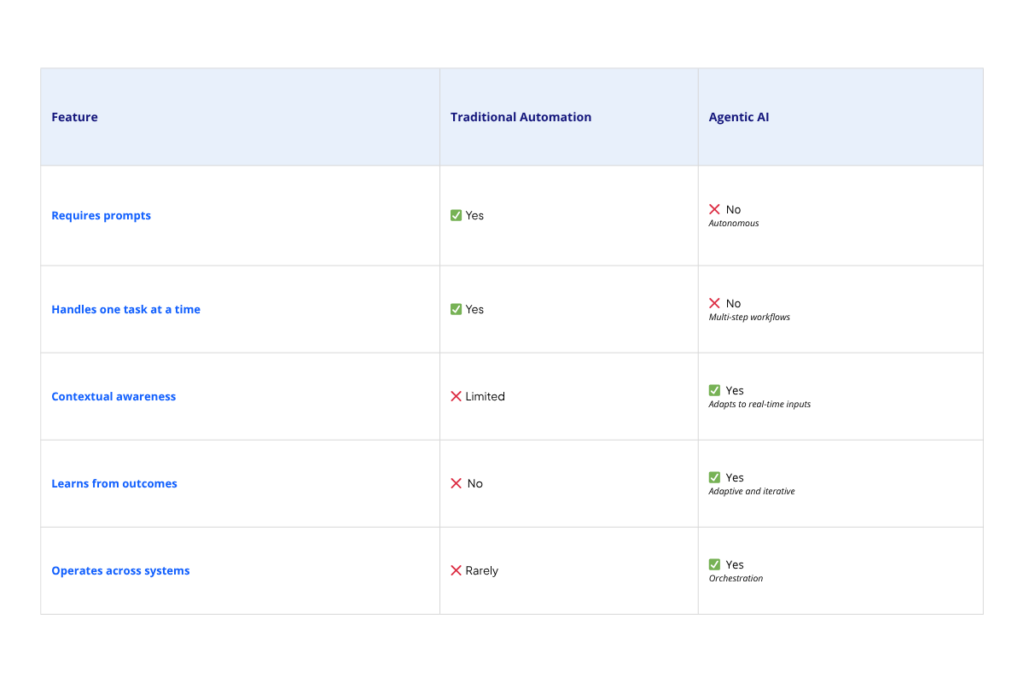
1. Screening Bottlenecks Slow Down Hiring
The Problem:
Frontline hiring often operates at scale—but the screening process still relies heavily on manual resume review, disjointed systems, and delayed scheduling. These inefficiencies create bottlenecks that slow down hiring, increase drop-off, and leave roles unfilled longer than necessary.
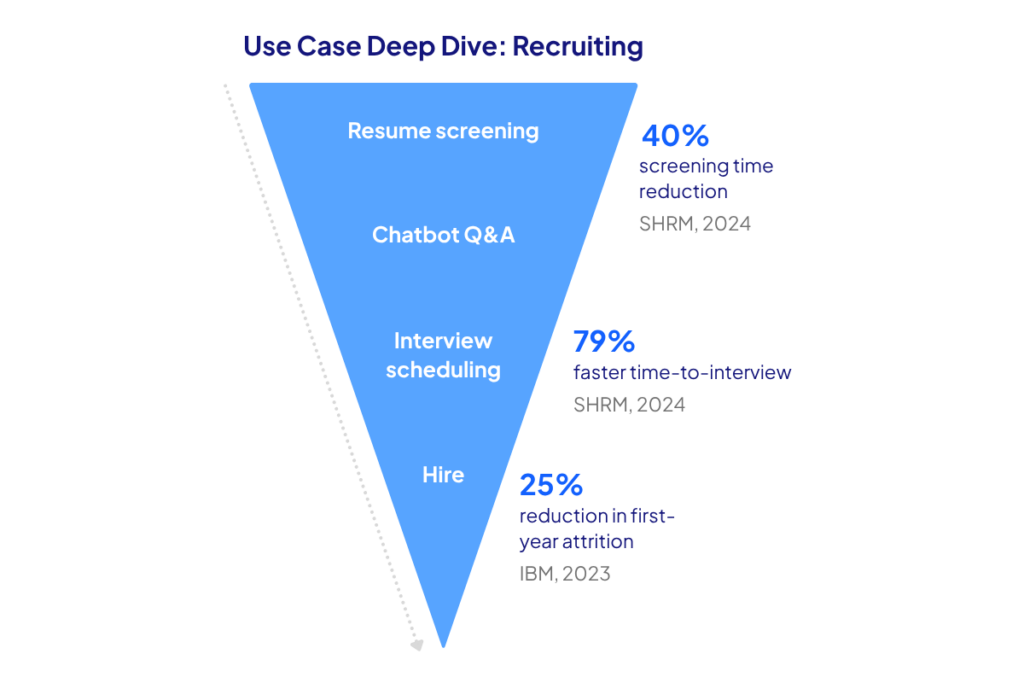
The Agentic AI Advantage:
📉 Interviews get scheduled up to 79% faster with Agentic AI.
Agentic AI handles screening through interactive, real-time conversations. It assesses candidate fit, answers questions, and schedules interviews automatically—based on recruiter availability. All without waiting for a human to trigger the next step.
This frees up HR teams to focus on what truly matters: building relationships, reducing time-to-fill, and driving more strategic hiring outcomes.
👉 Fountain’s AI Recruiter is one example—acting as a digital hiring assistant that engages applicants and moves qualified talent forward in seconds.
2. Turnover Erodes ROI and Morale
The Problem:
High churn is a constant challenge in frontline work, but HR leaders often lack visibility into the reasons for—or likelihood of—disengagement until after an employee quits.
The Agentic AI Advantage:
📉 Predictive tools can help reduce first-year turnover by as much as 30%.
Agentic AI monitors behavioral signals, engagement patterns, and feedback loops to flag attrition risk early. It then proposes actionable interventions—like shift adjustments, check-ins, or recognition nudges—to help retain high-potential workers. This gives HR teams real-time visibility into flight risks and enables them to take proactive steps before issues escalate—reducing reactive workload and improving retention outcomes.
👉 Solutions like Fountain Pulse use short-form surveys and AI analysis to surface risk indicators and alert managers in real time.
3. Labor Costs Spike from Scheduling Inefficiencies
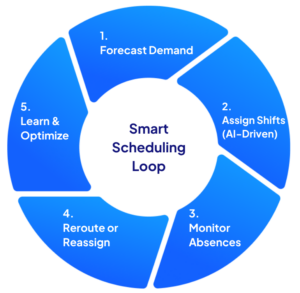
The Problem:
When demand changes or workers miss shifts, teams end up overstaffed, understaffed, or out of compliance.
The Agentic AI Advantage:
💰 AI-powered scheduling can help cut labor costs by up to 15%. (McKinsey, 2023)
Agentic AI generates dynamic schedules that factor in labor laws, employee preferences, historical patterns, and forecasted demand. It updates in real time when disruptions occur—without waiting for manager input. This reduces manual scheduling work, minimizes compliance risk, and gives HR teams more time to focus on strategic workforce planning.
4. HR Teams Are Buried in Repetitive Tasks
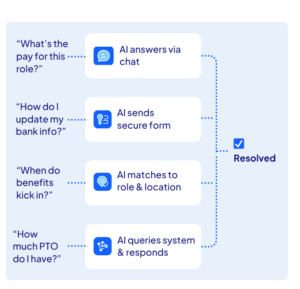
The Problem:
HR help desks are flooded with repetitive questions—such as PTO balances and onboarding steps—especially in high-turnover environments.
The Agentic AI Advantage:
✅ 70% of HR questions can now be resolved through conversational AI. (SHRM, 2023)
Agentic AI assistants resolve common HR inquiries instantly—24/7—with full audit trails and built-in escalation protocols. By handling repetitive questions around policies, onboarding, and benefits, they give HR teams time back to focus on people, not paperwork.
👉 Help desk automation supports real-time resolution of HR tickets, reducing volume and improving response consistency.
5. Onboarding Is Error-Prone and Inconsistent
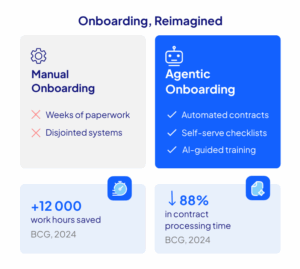
The Problem:
Frontline onboarding is often slowed down by disconnected systems, manual paperwork, and delays—leading to no-shows and compliance risks.
The Agentic AI Advantage:
🚀 AI-enabled onboarding speeds up contract processing by 88%.
Agentic AI guides each new hire through a personalized onboarding workflow—triggering contracts, verifying documentation, and syncing training based on location and role.
For HR teams, this means less manual oversight, fewer errors, and peace of mind knowing every step is logged, compliant, and audit-ready by default.
Why This Shift Matters Now
This isn’t a passing trend. Agentic AI is redefining how work gets done—faster, smarter, and with less friction. Research shows that:
- 65% of CHROs plan to deploy AI in talent acquisition within the next 12 months. (Gartner, 2024)
- 52% of enterprise leaders rank Agentic AI among their top three innovation priorities. (Deloitte, 2025)
- 92% of companies say they will increase AI investments over the next three years. (McKinsey, 2025)
For roles where speed and scale are non-negotiable, the benefits of Agentic AI are especially transformational.
Conclusion: From Automation to Orchestration
Agentic AI is not here to replace recruiters or HR professionals—it’s here to empower them. By taking on the tasks that drain time and focus, agentic systems free up HR teams to do what they do best: coach, connect, and lead.
The organizations seeing results today aren’t waiting for perfection—they’re piloting, learning, and iterating with real use cases and measurable impact.
